人教新课标高中英语必修四Unit4 Body language grammar课件 (共33张PPT)
文档属性
| 名称 | 人教新课标高中英语必修四Unit4 Body language grammar课件 (共33张PPT) |
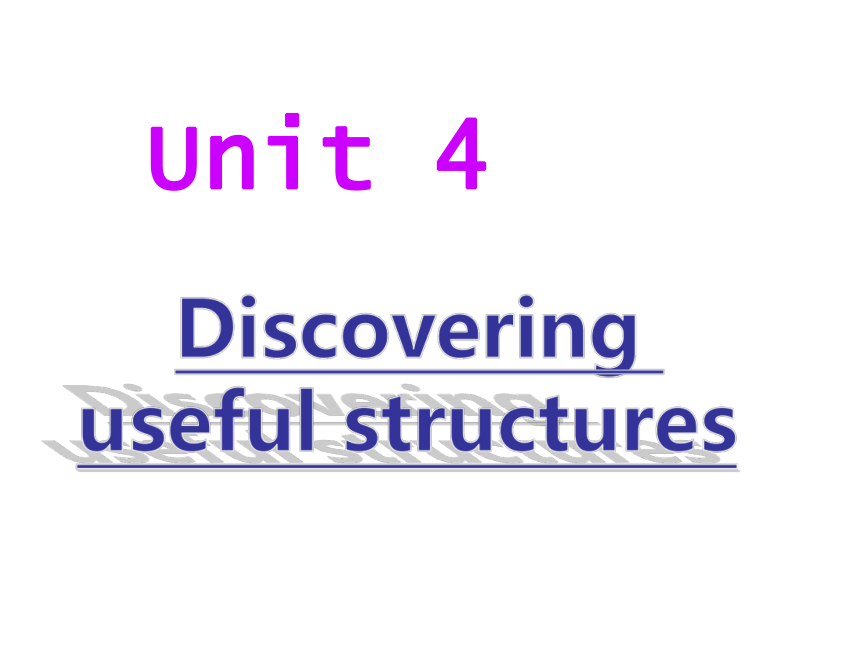
|
|
| 格式 | zip | ||
| 文件大小 | 297.8KB | ||
| 资源类型 | 教案 | ||
| 版本资源 | 人教版(新课程标准) | ||
| 科目 | 英语 | ||
| 更新时间 | 2017-05-22 00:00:00 | ||
图片预览

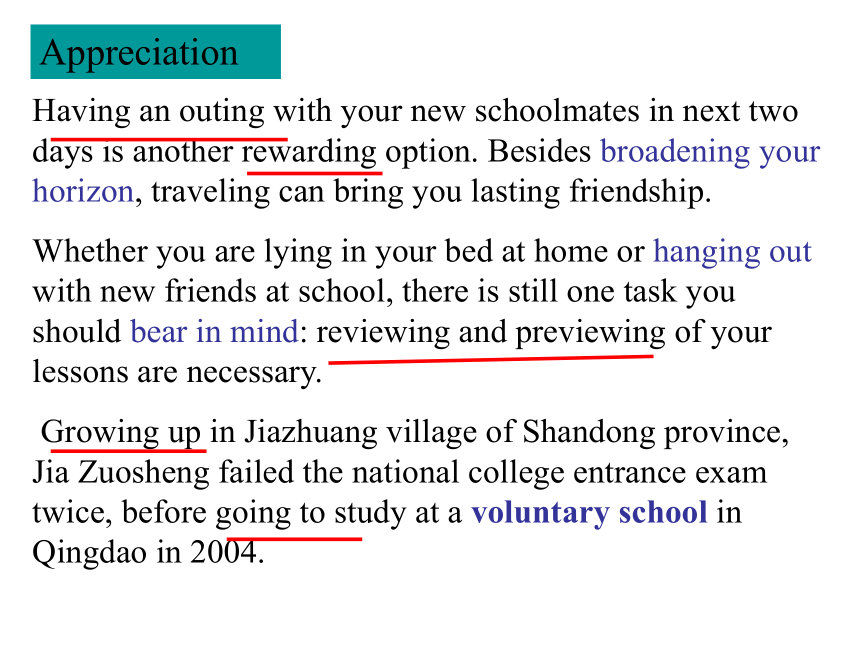


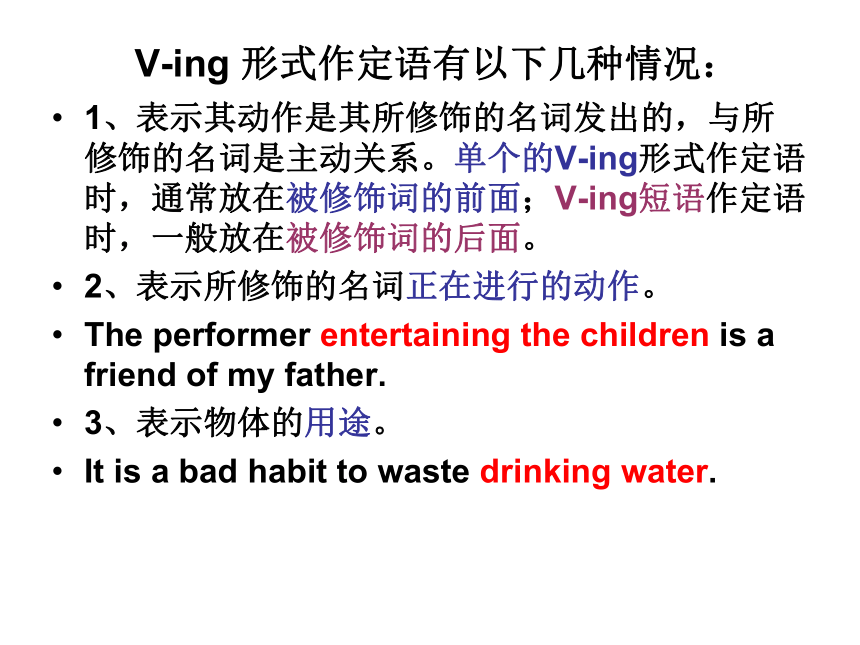
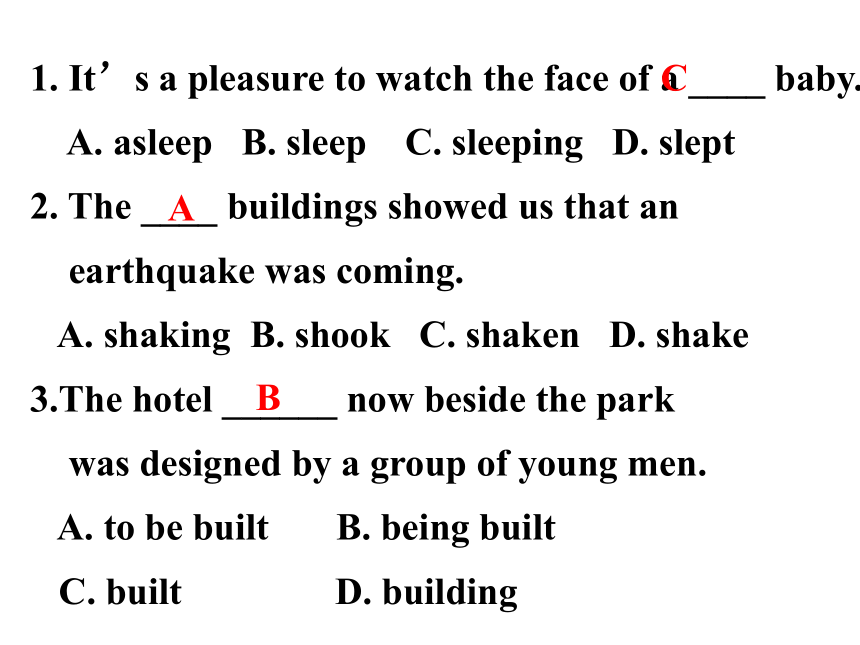

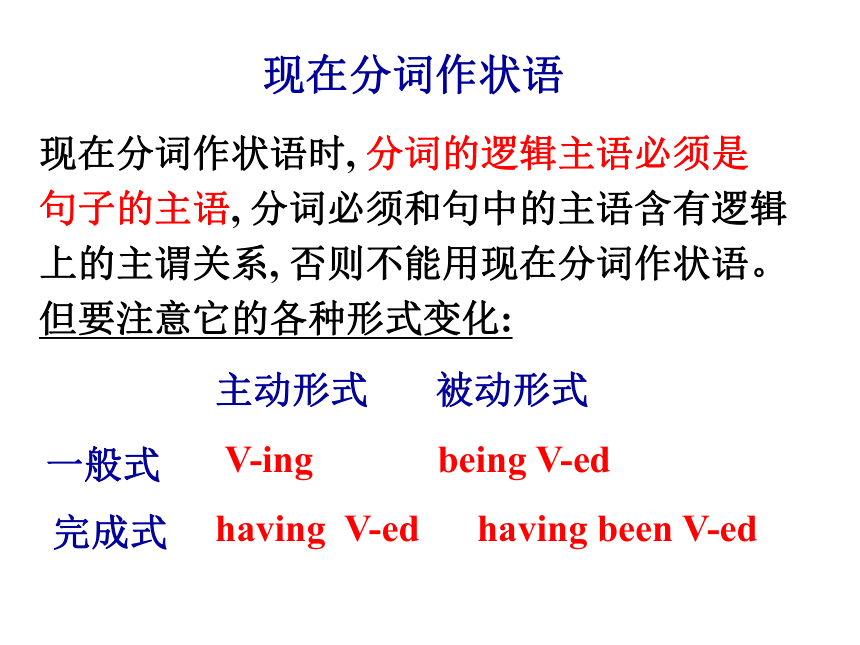
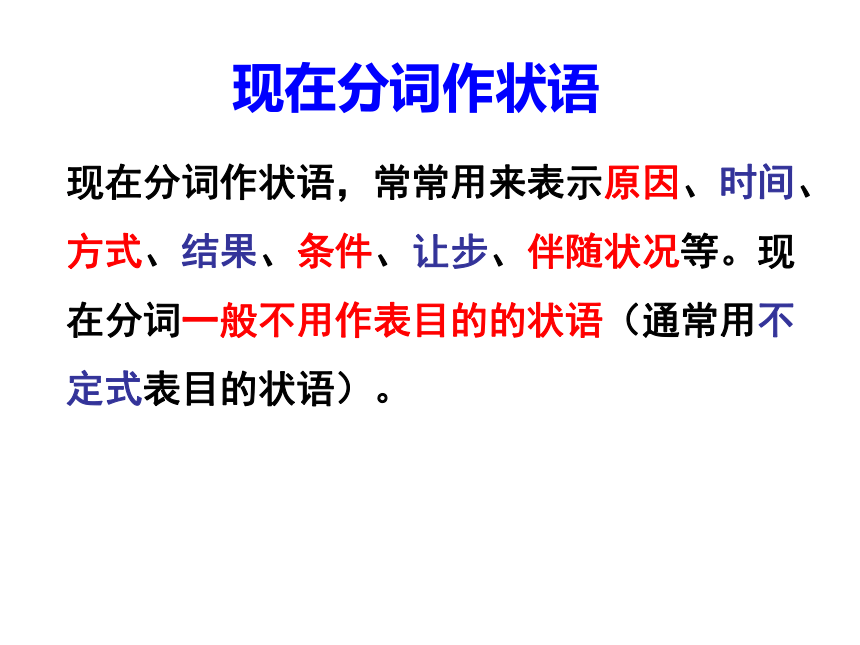
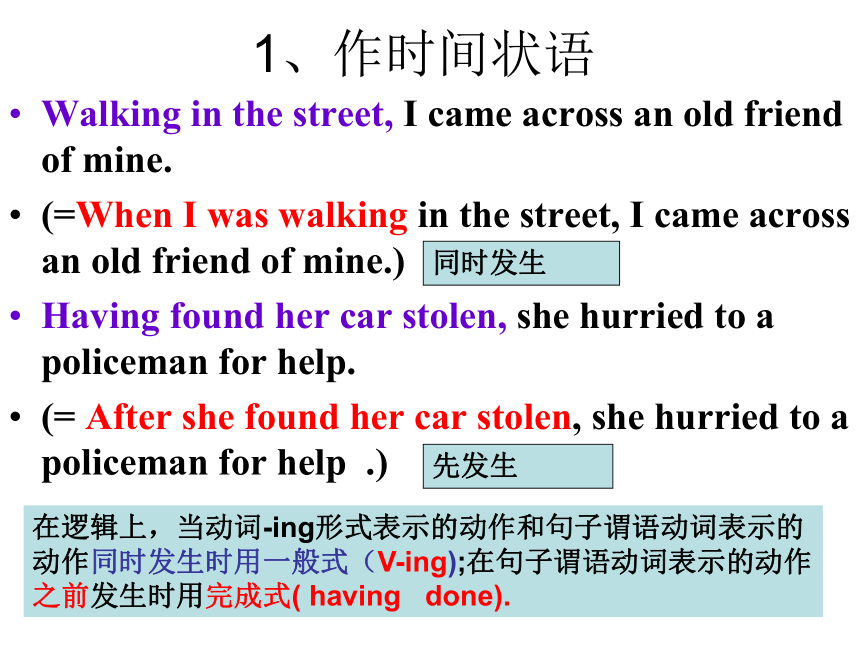
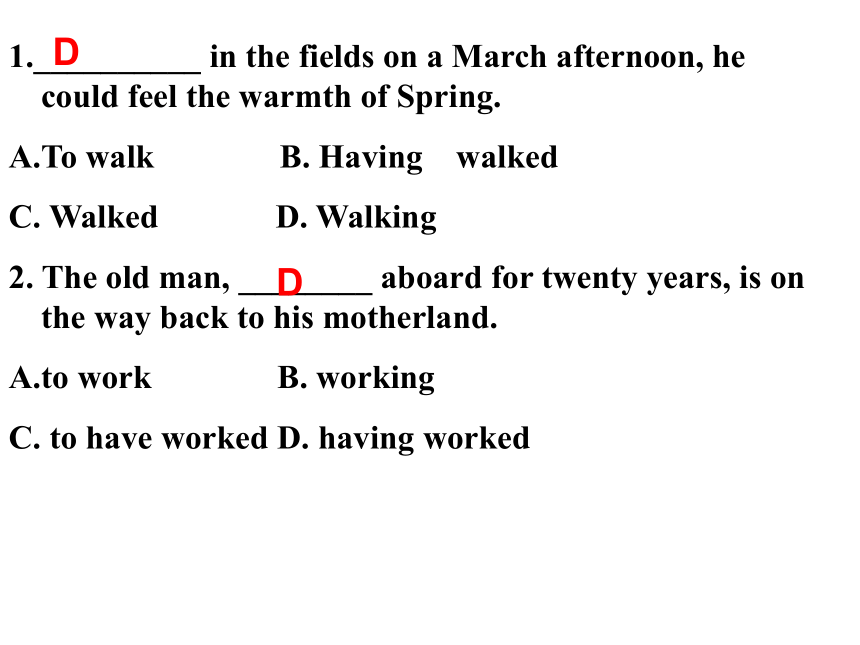
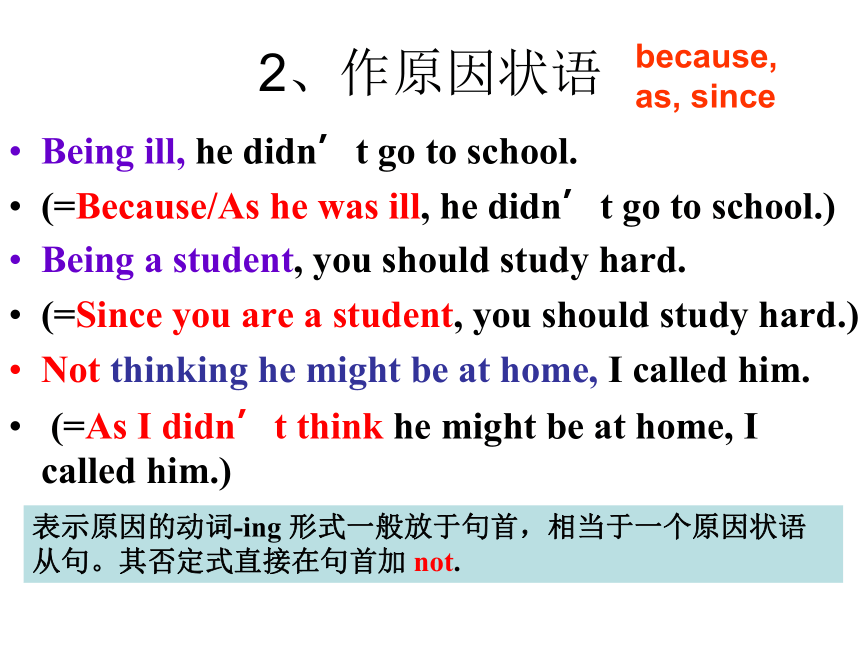
文档简介
课件33张PPT。Discovering
useful structuresUnit 4Having an outing with your new schoolmates in next two days is another rewarding option. Besides broadening your horizon, traveling can bring you lasting friendship.
Whether you are lying in your bed at home or hanging out with new friends at school, there is still one task you should bear in mind: reviewing and previewing of your lessons are necessary.
Growing up in Jiazhuang village of Shandong province, Jia Zuosheng failed the national college entrance exam twice, before going to study at a voluntary school in Qingdao in 2004.Appreciation V-ing 作定语和状语attribute 定语 是修饰___词.单词作定语时通常放在它所修饰的名词之_____;短语和从句作定语时则放在它所修饰的名词之_____。名前后V-ing 形式作定语有以下几种情况:1、表示其动作是其所修饰的名词发出的,与所修饰的名词是主动关系。单个的V-ing形式作定语时,通常放在被修饰词的前面;V-ing短语作定语时,一般放在被修饰词的后面。
2、表示所修饰的名词正在进行的动作。
The performer entertaining the children is a friend of my father.
3、表示物体的用途。
It is a bad habit to waste drinking water.1. It’s a pleasure to watch the face of a ____ baby.
A. asleep B. sleep C. sleeping D. slept
2. The ____ buildings showed us that an
earthquake was coming.
A. shaking B. shook C. shaken D. shake
3.The hotel ______ now beside the park
was designed by a group of young men.
A. to be built B. being built
C. built D. buildingCAB 状语修饰动词、形容词、副词或整个句子,说明动作或状态的特征状语表示地点、时间、原因、目的、结果、条件、让步、伴随情况等。adverbial现在分词作状语现在分词作状语时, 分词的逻辑主语必须是
句子的主语, 分词必须和句中的主语含有逻辑
上的主谓关系, 否则不能用现在分词作状语。
但要注意它的各种形式变化:主动形式 被动形式
V-ing being V-ed
having V-ed having been V-ed 一般式完成式现在分词作状语现在分词作状语,常常用来表示原因、时间、方式、结果、条件、让步、伴随状况等。现在分词一般不用作表目的的状语(通常用不定式表目的状语)。1、作时间状语Walking in the street, I came across an old friend of mine.
(=When I was walking in the street, I came across an old friend of mine.)
Having found her car stolen, she hurried to a policeman for help.
(= After she found her car stolen, she hurried to a policeman for help .)
同时发生先发生在逻辑上,当动词-ing形式表示的动作和句子谓语动词表示的动作同时发生时用一般式(V-ing);在句子谓语动词表示的动作之前发生时用完成式( having done).1.__________ in the fields on a March afternoon, he could feel the warmth of Spring.
To walk B. Having walked
C. Walked D. Walking
2. The old man, ________ aboard for twenty years, is on the way back to his motherland.
to work B. working
C. to have worked D. having workedDD2、作原因状语Being ill, he didn’t go to school.
(=Because/As he was ill, he didn’t go to school.)
Being a student, you should study hard.
(=Since you are a student, you should study hard.)
Not thinking he might be at home, I called him.
(=As I didn’t think he might be at home, I called him.)
because, as, since表示原因的动词-ing 形式一般放于句首,相当于一个原因状语从句。其否定式直接在句首加 not.1. ____ a reply, he decided to write again.(NMET92)
Not receiving B. Receiving not
C. Not having received D. Having not received
2. ______ his telephone number, she had some
difficulty getting in touch with Bill. (1991上海)
Not knowing B. knowing not
C. Not having known D. Having not knownCA现在分词作原因状语, 分词结构中否定词
通常放在现在分词前面。作原因状语 3、作方式、伴随状语: 作伴随状语的分词表示的动作必须是主语的一个动作,或是与谓语表示的动作或状态同时发生,或补充说明谓语的具体情况。 He sat on the sofa, watching TV.
(=He sat on the sofa, and watched TV.)
I saw several young people enter the waiting area looking around curiously.
(=I saw several young people enter the waiting area and they looked around curiously.)
动词-ing 表伴随时,可以扩展成为一个并列句。1.The secretary worked late into the night, ______ a long speech for the president.
who prepares B. preparing
C. prepared D. was preparing
2. He looked around and caught a man _____ his hand into the pocket of a passenger.(2004.北京)
A. put B. to be put C. to put D. puttingBD4、作结果状语Unfortunately his father died, leaving the family even worse off.
(=Unfortunately his father died, and left the family even worse off.)
全国到处在传唱这首歌曲,使它成了一首最受欢迎的歌曲。
The song is sung all over the country, _____________________________ .
making it the most popular song5、作条件状语Working harder, you will succeed.
(=If you work harder, you will succeed.)
动词-ing 形式作条件状语,相当于一个条件状语从句。
一直往前走,你就会看到一座白色的房子。
Walking ahead, you will see a white house.
Keeping on trying, you will realize your dream.
Keep on trying, and you will realize your dream.6、作让步状语Being young,the little boy knows a lot about computer.
(=Though the little boy is young, he knows a lot about computer.)
Being clever enough, you should ask me for more advice.
(=Although you are clever enough, you should ask me for more advice.)
though, althoughTime permitting, I will pay a visit to the whole city. 7. 独立主格结构我们到达长春时是午夜。______________________, it was midnight.We arriving in chuangchun
分词作状语时, 分词的逻辑助于必须与句子的主语保持一致。当非谓语动作的主语不是句子的主语时,必须加上其自己的逻辑主语,这种结构成为独立主格结构。如:
独立成分作状语有些分词作状语时,起形式的选用不收上下文的影响,称作独立成分或插入语。常见的有:generally / frankly/ strictly speaking 一般而言/坦率地说/ 严格地说
judging from /by 根据…来判断
considering / taking …into consideration考虑到…;鉴于…
supposing / providing /provided that 如果
compared with 与…相比
例如
① Judging from his accent ,he is from the south .
② Considering your health , you ‘d better have a rest .
练习:1. Many students _____ around, I explained the story into details.(07 重庆)
A. stood B. standing
C. to stand D. were standing
2.There ___ nothing to talk about , every one in the room remained silent .
A. was B. had C. being D. having
现在分词与过去分词区别两者之间的区别主要体现在时态和语态上:
(1)在时态上:现在分词表示正在进行,而过去分词表示已经完成。例如:
(2)在语态上:现在分词表示主动;而过去分词表示被动。
总之,现在分词表主动、进行;
过去分词表被动、完成。
在句法功能上它们都可以作定语和状语,它们的具体区别如下: China is a developing country,while
America is a developed one.1、作定语时取决于分词与被修饰词的关系:
主动关系或主谓关系用 doing
被动关系或动宾关系用 doneThe meeting held last week is very important.
2.Tell the children playing there not to make so much noise.
3. They lived in a room facing the south.
4. I hate to see letters written in pencil.被动关系被动关系主动关系主动关系练习1. Mrs.White showed her students some old maps ______ from the library.(10 全国1)
to borrow B. to be borrowed C. borrowed D. borrowing
2. For breakfast he only drinks juice from fresh fruit _____ on his own farm. (09 北京)
grown B. being grown C. to be grown D. to grow
3. There is a great deal of evidence _______ that music activities engage different parts of the brain.(09浙江)
A. indicate B. indicating
C. to indicate D. to be indicating
4. With the government’s aid, those _____ by the earthquake have moved to the new settlements. (09上海)
A. affect B. affecting C. affected D. were affected 2.作状语时1).分词的选取:取决于分词与句子主语的关系:
主动关系,用 doing
被动关系,用 done 例如:
Seen from the moon, the earth looks like a blue ball.
Seeing nobody at home , he left.
被动关系主动关系练习:1. It rained heavily in the south,_____serious flooding in several provinces.(10天津)
caused B. having caused
C. causing D. to cause
2 ___the city center, we saw a stone statue of about 10 meters in height.(10上海)
Approaching B. Approached
C. To approach D. To be approached
3. ____at my classmates‘ faces, I read the same excitement in their eyes.(10北京)
A. Looking B. Look C. To look D. Looked4. (2005山东卷)Oil prices have risen by 32 percent since the start of the year, ___ a record US $57. 65 a barrel on April 4. A. have reached? B. reaching??
C. to reach? D. to be reaching
5. (2007 浙江卷)______ by a greater demand of vegetables, farmers have built more green houses.
A. Driven B. Being driven
C. To drive D. Having driven 1. When he approached Ms Smith, he touched her shoulder and kissed her.
______ ___________ Ms Smith, he touched her shoulder and kissed her. Rewrite the following sentences.Whenapproaching2. The person who is translating the songs can speak seven languages.
The person _________ ___ ______can speak seven languages.translatingthesongs3. The boy standing there is reading a book about body language.
The boy ____ __ ________ there is reading a book about body language.whois standing4. Because he comes from Jordan, he moves close to ask you a question.
_______ _____ Jordan, he moves close to ask you a question.Coming from5. She sat at the desk and did her homework.
She sat at the desk ______ ____ __________.doing herhomework Grammar work 语法专练
用所给动词的适当形式填空。
1. Not ________(know) his address, I couldn’t go to see him yesterday.
2. Look out for cars when _______(cross) the street.
3. Not _________________ (invite) to the party, Mary was greatly hurt.knowingcrossinghaving been invited4. He dived into the water, ______ (leave) only his face exposed.
5. When I got back home I saw a message pinned to the door, _______ (read)
“Sorry to miss you; I will call later.”
6. _______ (take) a deep breath, they dived into the water.
7. ____________ (close) the windows and the door, the students left the room.leavingreadingTakingHaving closedHomework Finish the paper on grammar.
Recite the sample writing.
useful structuresUnit 4Having an outing with your new schoolmates in next two days is another rewarding option. Besides broadening your horizon, traveling can bring you lasting friendship.
Whether you are lying in your bed at home or hanging out with new friends at school, there is still one task you should bear in mind: reviewing and previewing of your lessons are necessary.
Growing up in Jiazhuang village of Shandong province, Jia Zuosheng failed the national college entrance exam twice, before going to study at a voluntary school in Qingdao in 2004.Appreciation V-ing 作定语和状语attribute 定语 是修饰___词.单词作定语时通常放在它所修饰的名词之_____;短语和从句作定语时则放在它所修饰的名词之_____。名前后V-ing 形式作定语有以下几种情况:1、表示其动作是其所修饰的名词发出的,与所修饰的名词是主动关系。单个的V-ing形式作定语时,通常放在被修饰词的前面;V-ing短语作定语时,一般放在被修饰词的后面。
2、表示所修饰的名词正在进行的动作。
The performer entertaining the children is a friend of my father.
3、表示物体的用途。
It is a bad habit to waste drinking water.1. It’s a pleasure to watch the face of a ____ baby.
A. asleep B. sleep C. sleeping D. slept
2. The ____ buildings showed us that an
earthquake was coming.
A. shaking B. shook C. shaken D. shake
3.The hotel ______ now beside the park
was designed by a group of young men.
A. to be built B. being built
C. built D. buildingCAB 状语修饰动词、形容词、副词或整个句子,说明动作或状态的特征状语表示地点、时间、原因、目的、结果、条件、让步、伴随情况等。adverbial现在分词作状语现在分词作状语时, 分词的逻辑主语必须是
句子的主语, 分词必须和句中的主语含有逻辑
上的主谓关系, 否则不能用现在分词作状语。
但要注意它的各种形式变化:主动形式 被动形式
V-ing being V-ed
having V-ed having been V-ed 一般式完成式现在分词作状语现在分词作状语,常常用来表示原因、时间、方式、结果、条件、让步、伴随状况等。现在分词一般不用作表目的的状语(通常用不定式表目的状语)。1、作时间状语Walking in the street, I came across an old friend of mine.
(=When I was walking in the street, I came across an old friend of mine.)
Having found her car stolen, she hurried to a policeman for help.
(= After she found her car stolen, she hurried to a policeman for help .)
同时发生先发生在逻辑上,当动词-ing形式表示的动作和句子谓语动词表示的动作同时发生时用一般式(V-ing);在句子谓语动词表示的动作之前发生时用完成式( having done).1.__________ in the fields on a March afternoon, he could feel the warmth of Spring.
To walk B. Having walked
C. Walked D. Walking
2. The old man, ________ aboard for twenty years, is on the way back to his motherland.
to work B. working
C. to have worked D. having workedDD2、作原因状语Being ill, he didn’t go to school.
(=Because/As he was ill, he didn’t go to school.)
Being a student, you should study hard.
(=Since you are a student, you should study hard.)
Not thinking he might be at home, I called him.
(=As I didn’t think he might be at home, I called him.)
because, as, since表示原因的动词-ing 形式一般放于句首,相当于一个原因状语从句。其否定式直接在句首加 not.1. ____ a reply, he decided to write again.(NMET92)
Not receiving B. Receiving not
C. Not having received D. Having not received
2. ______ his telephone number, she had some
difficulty getting in touch with Bill. (1991上海)
Not knowing B. knowing not
C. Not having known D. Having not knownCA现在分词作原因状语, 分词结构中否定词
通常放在现在分词前面。作原因状语 3、作方式、伴随状语: 作伴随状语的分词表示的动作必须是主语的一个动作,或是与谓语表示的动作或状态同时发生,或补充说明谓语的具体情况。 He sat on the sofa, watching TV.
(=He sat on the sofa, and watched TV.)
I saw several young people enter the waiting area looking around curiously.
(=I saw several young people enter the waiting area and they looked around curiously.)
动词-ing 表伴随时,可以扩展成为一个并列句。1.The secretary worked late into the night, ______ a long speech for the president.
who prepares B. preparing
C. prepared D. was preparing
2. He looked around and caught a man _____ his hand into the pocket of a passenger.(2004.北京)
A. put B. to be put C. to put D. puttingBD4、作结果状语Unfortunately his father died, leaving the family even worse off.
(=Unfortunately his father died, and left the family even worse off.)
全国到处在传唱这首歌曲,使它成了一首最受欢迎的歌曲。
The song is sung all over the country, _____________________________ .
making it the most popular song5、作条件状语Working harder, you will succeed.
(=If you work harder, you will succeed.)
动词-ing 形式作条件状语,相当于一个条件状语从句。
一直往前走,你就会看到一座白色的房子。
Walking ahead, you will see a white house.
Keeping on trying, you will realize your dream.
Keep on trying, and you will realize your dream.6、作让步状语Being young,the little boy knows a lot about computer.
(=Though the little boy is young, he knows a lot about computer.)
Being clever enough, you should ask me for more advice.
(=Although you are clever enough, you should ask me for more advice.)
though, althoughTime permitting, I will pay a visit to the whole city. 7. 独立主格结构我们到达长春时是午夜。______________________, it was midnight.We arriving in chuangchun
分词作状语时, 分词的逻辑助于必须与句子的主语保持一致。当非谓语动作的主语不是句子的主语时,必须加上其自己的逻辑主语,这种结构成为独立主格结构。如:
独立成分作状语有些分词作状语时,起形式的选用不收上下文的影响,称作独立成分或插入语。常见的有:generally / frankly/ strictly speaking 一般而言/坦率地说/ 严格地说
judging from /by 根据…来判断
considering / taking …into consideration考虑到…;鉴于…
supposing / providing /provided that 如果
compared with 与…相比
例如
① Judging from his accent ,he is from the south .
② Considering your health , you ‘d better have a rest .
练习:1. Many students _____ around, I explained the story into details.(07 重庆)
A. stood B. standing
C. to stand D. were standing
2.There ___ nothing to talk about , every one in the room remained silent .
A. was B. had C. being D. having
现在分词与过去分词区别两者之间的区别主要体现在时态和语态上:
(1)在时态上:现在分词表示正在进行,而过去分词表示已经完成。例如:
(2)在语态上:现在分词表示主动;而过去分词表示被动。
总之,现在分词表主动、进行;
过去分词表被动、完成。
在句法功能上它们都可以作定语和状语,它们的具体区别如下: China is a developing country,while
America is a developed one.1、作定语时取决于分词与被修饰词的关系:
主动关系或主谓关系用 doing
被动关系或动宾关系用 doneThe meeting held last week is very important.
2.Tell the children playing there not to make so much noise.
3. They lived in a room facing the south.
4. I hate to see letters written in pencil.被动关系被动关系主动关系主动关系练习1. Mrs.White showed her students some old maps ______ from the library.(10 全国1)
to borrow B. to be borrowed C. borrowed D. borrowing
2. For breakfast he only drinks juice from fresh fruit _____ on his own farm. (09 北京)
grown B. being grown C. to be grown D. to grow
3. There is a great deal of evidence _______ that music activities engage different parts of the brain.(09浙江)
A. indicate B. indicating
C. to indicate D. to be indicating
4. With the government’s aid, those _____ by the earthquake have moved to the new settlements. (09上海)
A. affect B. affecting C. affected D. were affected 2.作状语时1).分词的选取:取决于分词与句子主语的关系:
主动关系,用 doing
被动关系,用 done 例如:
Seen from the moon, the earth looks like a blue ball.
Seeing nobody at home , he left.
被动关系主动关系练习:1. It rained heavily in the south,_____serious flooding in several provinces.(10天津)
caused B. having caused
C. causing D. to cause
2 ___the city center, we saw a stone statue of about 10 meters in height.(10上海)
Approaching B. Approached
C. To approach D. To be approached
3. ____at my classmates‘ faces, I read the same excitement in their eyes.(10北京)
A. Looking B. Look C. To look D. Looked4. (2005山东卷)Oil prices have risen by 32 percent since the start of the year, ___ a record US $57. 65 a barrel on April 4. A. have reached? B. reaching??
C. to reach? D. to be reaching
5. (2007 浙江卷)______ by a greater demand of vegetables, farmers have built more green houses.
A. Driven B. Being driven
C. To drive D. Having driven 1. When he approached Ms Smith, he touched her shoulder and kissed her.
______ ___________ Ms Smith, he touched her shoulder and kissed her. Rewrite the following sentences.Whenapproaching2. The person who is translating the songs can speak seven languages.
The person _________ ___ ______can speak seven languages.translatingthesongs3. The boy standing there is reading a book about body language.
The boy ____ __ ________ there is reading a book about body language.whois standing4. Because he comes from Jordan, he moves close to ask you a question.
_______ _____ Jordan, he moves close to ask you a question.Coming from5. She sat at the desk and did her homework.
She sat at the desk ______ ____ __________.doing herhomework Grammar work 语法专练
用所给动词的适当形式填空。
1. Not ________(know) his address, I couldn’t go to see him yesterday.
2. Look out for cars when _______(cross) the street.
3. Not _________________ (invite) to the party, Mary was greatly hurt.knowingcrossinghaving been invited4. He dived into the water, ______ (leave) only his face exposed.
5. When I got back home I saw a message pinned to the door, _______ (read)
“Sorry to miss you; I will call later.”
6. _______ (take) a deep breath, they dived into the water.
7. ____________ (close) the windows and the door, the students left the room.leavingreadingTakingHaving closedHomework Finish the paper on grammar.
Recite the sample writing.
同课章节目录
